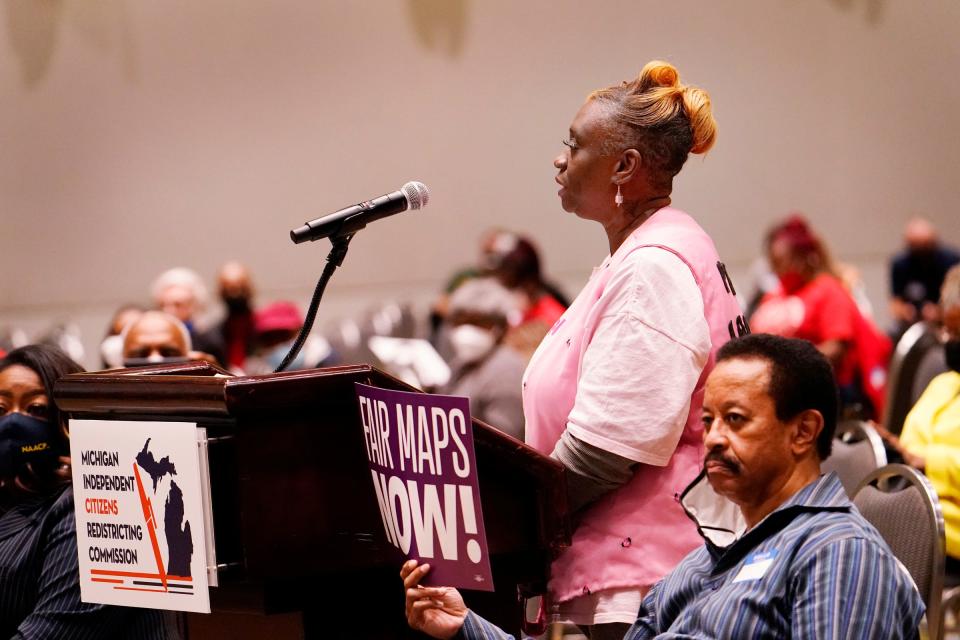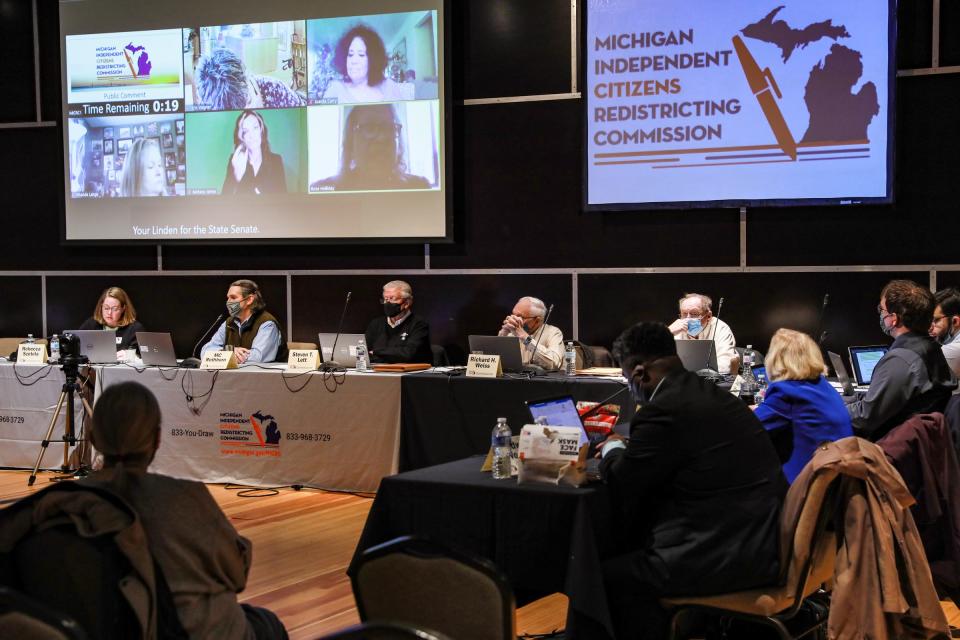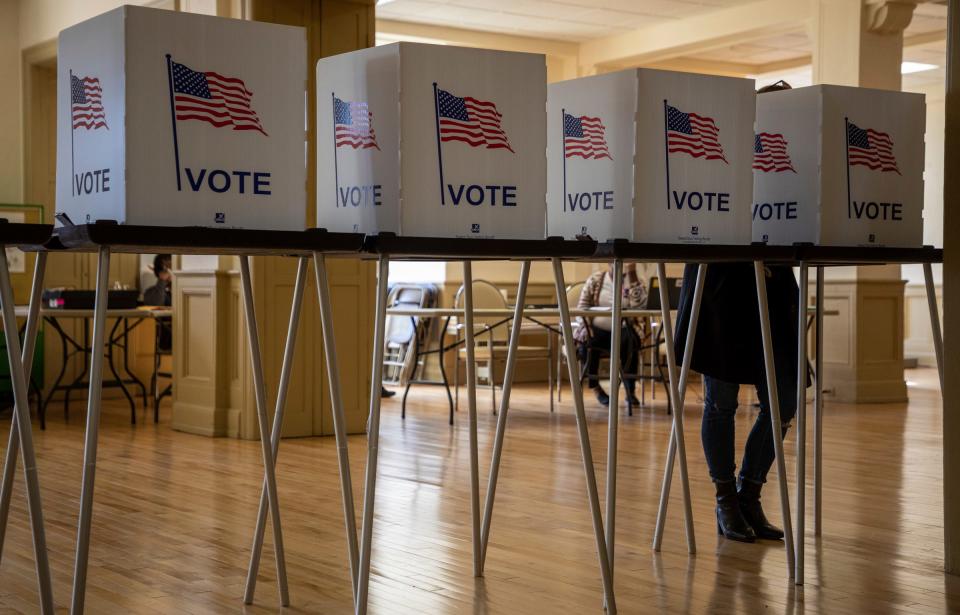What happens after court ordered Detroit legislative districts redrawn?
Lawmakers who don't know where they’ll run in next year’s elections in Michigan. Voters who may be surprised to see their current state representative not on their ballot. These uncertainties loom over an election with Democratic control of the Michigan House on the line after a three-judge panel ruled more than a dozen Detroit-based state legislative districts unconstitutional and ordered them redrawn.
When Michigan voters changed the process for drawing district lines, they wrested control of the mapping process from politicians and placed the pen in the hands of a group of randomly selected citizens charged with drawing fair maps. Republican-drawn districts in previous redistricting cycles in Michigan resulted in maps deemed some of the most politically skewed in the country.
But some Black Democrats blasted how the commission drew Detroit.
The group of metro Detroit voters who sued Michigan's first-ever citizen-led redistricting commission alleged that the way the mappers split up Detroit threatened Black voters' representation. While the panel in the federal case didn't determine whether the commission violated federal voting rights requirements to give protected racial minorities an opportunity to elect their preferred candidates, it found the commission illegally drew district lines on the basis of race.
"We're thrilled that the Court unanimously ruled that the challenged districts are illegal and that Black voters in Detroit were disenfranchised," said plaintiffs' lawyer John Bursch, in an email. "The Court has rightly said that the maps can no longer be used, and we look forward to working with the Court and Commission to draw new maps that ensure everyone's rights are respected."
The commission's executive director, Edward Woods III, has not said whether the commission plans to appeal the case to the U.S. Supreme Court but said in an email the group "will consider its options moving forward." Woods noted the commission agreed with U.S. District Judge Janet Neff who wrote a concurring opinion calling the panel's opinion "unnecessarily harsh" on the group of novice mappers and their hired voting rights experts.

Here's a look at the stakes and what happens next.
Who will draw the lines?
In a scheduling order, the panel ordered the parties involved in the case to file supplemental briefs by 12 p.m. Jan. 2, 2024, addressing the process for fixing the districts ruled unconstitutional. The panel indicated the commission may receive some outside help from a special master who could help the mappers adjust the district lines in time for the 2024 elections.
"Although an option, the special master would not necessarily draft new maps, but instead may assist the Commission and act as a liaison to this Court as the Commission performs its duties," the scheduling order states.
After filing briefs, the parties involved in the lawsuit will appear in court to discuss the redrawing process.

Attorney Steve Liedel doesn't anticipate a special master will redraw the lines without any involvement from the redistricting commission. In redistricting lawsuits, federal courts typically order the entity responsible for redistricting at the state level to adjust any district maps found to violate federal law, Liedel said. And in Michigan, that entity is the citizen-led redistricting commission.
Can the lines be redrawn in time for the 2024 election?
Primaries for state House elections are scheduled for Aug. 6, 2024. Candidates and election officials need to undertake a series of logistical steps before then. Candidates seeking election to the House under the revised maps need to know which district they want to represent and file to run in it. That deadline is April 23, 2024.
Courts have sometimes authorized a delay in filing deadlines to leave enough time for a redraw.
Meanwhile, election officials need to update Michigan's voter file to reassign any impacted voters to their new districts.

In a Dec. 4 brief filed in the case, Secretary of State Jocelyn Benson noted the tight timeline could be difficult to follow. She didn't specify how long it would take for the state's elections bureau to update the voter files. "But unless relief is ordered quickly, the Secretary does not believe it remains possible for the voter list to be updated to implement new plans in time for the 2024 election cycle," Benson's brief states.
The panel's order prevents the secretary of state from holding future elections under the current districts.
Promote the Vote senior adviser Sharon Dolente noted the judges moved quickly for a federal case. "I think that there's a lot of anxiety and questions about timing, but I would say that this court seems to understand the importance of how their decision is going to impact other things," she said.
Michigan redistricting: Court orders metro Detroit legislative maps redrawn
Will redrawn districts threaten Democrats' electoral prospects?
Under the current state legislative maps drawn by the redistricting commission, Democrats won full control of the state Legislature for the first time in 40 years.
The lawsuit received financial support from a group affiliated with Republican Tony Daunt who serves on Michigan's elections panel. "Certainly, the fact that Republicans are funding this suit is maybe a sign that they see some partisan advantage to this," said Michael Li, senior counsel at the Brennan Center for Justice. But it remains unclear whether redrawing maps that split up Detroit by pairing neighborhoods with surrounding suburbs will impact the partisan fairness of the maps.
Michigan Democratic Party Chair Lavora Barnes expressed confidence her party would maintain control of the state House in next year's elections even under redrawn maps. "It's more clear than ever that a majority of Michiganders support our Democratic values and believe in what we are fighting for," Barnes said in a statement Thursday.
GOP operatives and Black Democrats from Detroit celebrated the panel's decision.
Former state Rep. Sherry-Gay Dagnogo who championed the lawsuit heralded the ruling. "This is the best Christmas Gift I've ever had!" she wrote in a Facebook post. Democratic congressional candidate Adam Hollier — who railed against the Detroit districts during the redistricting process — said in a post on X, formerly known as Twitter, that the panel's decision shows the redistricting commission intentionally diluted Black voters' electoral influence.
"The alliance of Republicans and Black lawmakers from Detroit … is not a new thing," said Jeff Timmer, who previously served as the executive director for the Michigan GOP and helped draw the lines when Republicans controlled the mapping process last decade. Black Democrats from Detroit supported GOP-drawn maps in 2001 and 2011, he said. Many of those districts had higher shares of Black voters than the maps drawn by the commission which eliminated majority-Black districts in the state Senate and reduced the number in the state House.

Some have argued the commission's maps benefited Democratic candidates at the expense of Black voters. But Hollier and other critics of the Detroit districts contended during the redistricting process that the mappers could level the playing field between Democrats and GOP candidates without threatening Black voters' political representation.
Contact Clara Hendrickson at chendrickson@freepress.com or 313-296-5743. Follow her on X, previously called Twitter, @clarajanehen.
This article originally appeared on Detroit Free Press: Will Michigan Democrats maintain control under redrawn maps?

